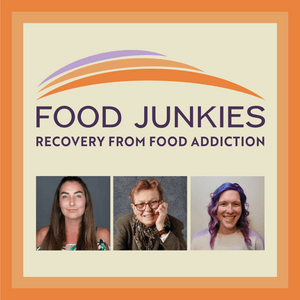Episode 232: Clinicians Corner - The Hidden Challenges of PAWS in Food Addiction Recovery
In this insightful and compassionate episode, Clarissa and Molly take a deep dive into post-acute withdrawal syndrome (PAWS)—an often overlooked but critical phase in ultra-processed food addiction recovery. While well-known in substance use disorder recovery, PAWS is rarely discussed in the context of food addiction, yet it shows up in significant ways. Clarissa and Molly break down what PAWS is, why it happens, and how it can show up months or even years into recovery. They share real client experiences, neurobiological explanations, and clinical insights—plus, they normalize what can feel like a confusing and distressing time. They also offer practical strategies for clients and clinicians alike, always with compassion, humor, and a forward-thinking, growth-focused perspective. 💡 Key Takeaways: ✅ What is PAWS? Post-acute withdrawal syndrome describes the emotional, psychological, and physical withdrawal symptoms that can persist or reappear months or years after quitting a substance (including ultra-processed foods). It’s a normal part of recovery, not a failure or a sign that you’re “doing it wrong.” ✅ When it shows up: Typically around the 3-, 6-, and 12-month marks, but can happen later—Molly shared an example of it showing up at 22 months! Can be a surprise to those who believed the cravings and struggles were only short-term. ✅ What it feels like: Physical symptoms: low energy, sleep issues, fatigue, and “meh” motivation. Emotional symptoms: irritability, anxiety, low mood, feeling “flat” or joyless (anhedonia). Cognitive symptoms: brain fog, intrusive food thoughts, and the return of “food dreams.” A heightened sensitivity to emotional triggers and stress, feeling like everything is a “zing” or too much. ✅ It’s actually a sign of healing. The brain is rewiring—dopamine pathways are adapting and recalibrating. It’s part of long-term recovery, a sign that deeper healing is taking place. ✅ Common client fears: “I thought I had this figured out—why am I struggling again?” “My coping skills don’t work anymore—what’s wrong with me?” Clarissa and Molly reframe this as an invitation to deepen your recovery work and adapt new strategies. ✅ What helps? Revisit the basics: simple structure with food, movement, sleep, and stress reduction. Connection and support: peer groups, Sweet Sobriety, or other safe spaces. Meaningful, non-food dopamine boosts: nature, creativity, connection, movement. Supplements: like omega-3s or l-glutamine (check with your provider!). Clinician support: not pushing but holding space with compassion and curiosity. ✅ For clinicians: Learn about PAWS from the substance use disorder literature—it’s crucial for validating and normalizing the client experience. Support clients without imposing your own fears about relapse—meet them with presence and empathy. Be mindful of co-occurring issues (trauma, chronic illness, medications) that can amplify PAWS. Don’t pathologize or shame—this is part of the healing arc! This conversation is a powerful reminder that healing is not linear. PAWS can feel like a step backward, but it’s actually a sign of forward movement. As Clarissa and Molly beautifully put it: “You’re not broken—you’re healing.” When PAWS shows up, it’s a call to pause, reset, and give yourself the same compassion and patience you’d offer anyone else in deep healing. Want to connect? Reach out to the team at: 📧
[email protected] Get Mollys PAWs Presentation here: https://www.sweetsobriety.ca The content of our show is educational only. It does not supplement or supersede your healthcare provider's professional relationship and direction. Always seek the advice of your physician or other qualified mental health providers with any questions you may have regarding a medical condition, substance use disorder, or mental health concern.
